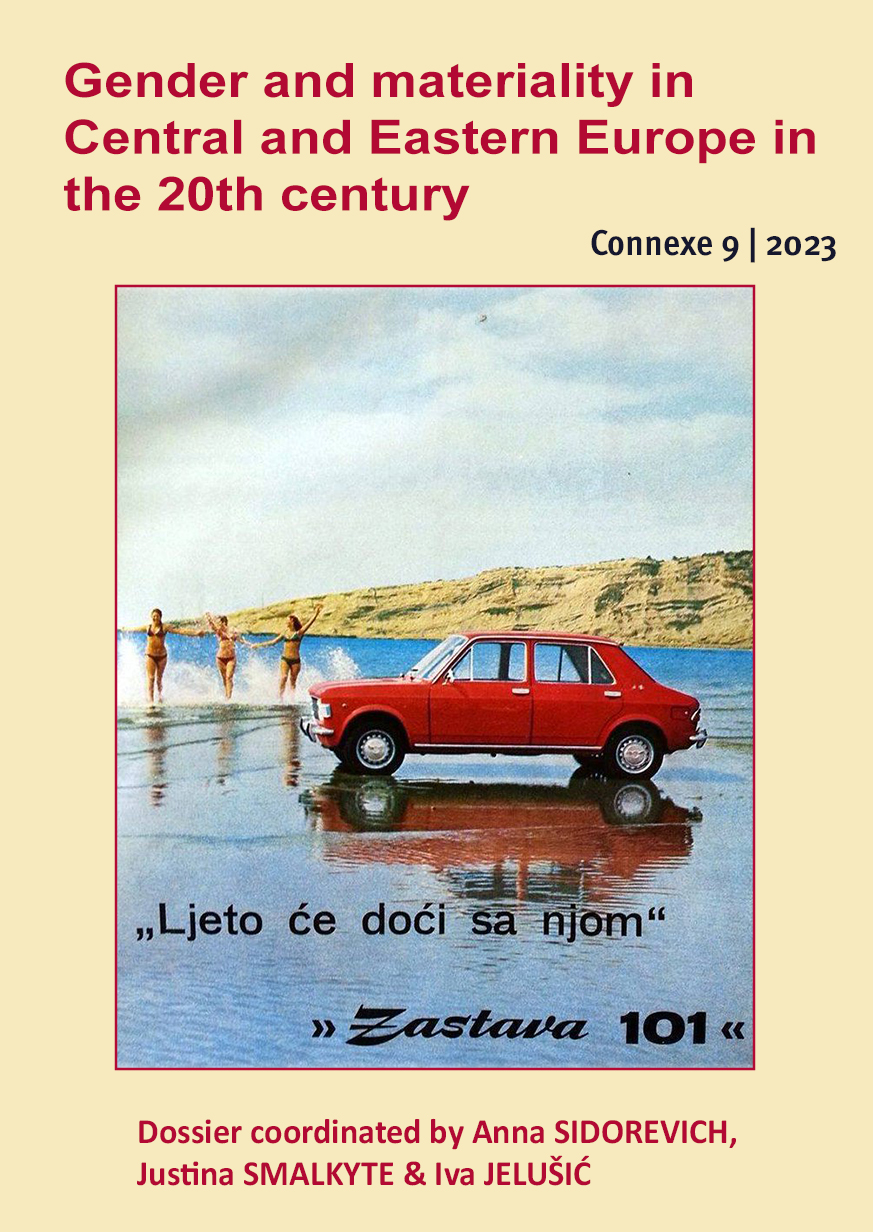“They look better on the breasts”: Advertisement, sexuality, and the bra business in postsocialist Poland
DOI :
https://doi.org/10.5077/journals/connexe.2023.e927Mots-clés :
post-socialisme, sous-vêtements, petites entreprises, sexualité, années 1990Résumé
Cet article examine la transition du socialisme au capitalisme durant les années 1990 en Pologne à travers le prisme de l’évolution du marché des sous-vêtements. Sur base d’entretiens, de documents d’archives des fabricants de soutiens-gorges, ainsi que d’une analyse de la presse contemporaine, j’examine comment l’intégration de l’économie polonaise dans le système capitaliste mondial après 1989 a influencé sa culture sexuelle. Cet article montre comment la fin du monopole du secteur public sur la production de sous-vêtements et l’essor du secteur privé ont facilité l’arrivée de nouvelles formes de soutiens-gorges sur le marché polonais qui ont été sexualisés par les médias et les fabricants eux-mêmes. Ces nouveaux produits imitaient les marques d’Europe occidentale, se distançant ainsi des sous-vêtements de l’ère socialiste, et apportaient une nouvelle technologie conçue pour modeler et discipliner les corps féminins. Grâce à l’analyse approfondie d’un article paru en 1996 sur le commerce des soutiens-gorges dans la Gazette électorale [Gazeta Wyborcza] – le plus grand quotidien de Pologne –, je démontre l’ambivalence des médias libéraux face à ces changements les dépeignant comme un choc générationnel entre les femmes, alors que de nombreux politiciens conservateurs et l’Église catholique appelaient à une censure plus stricte.
Références
Bartkowski, Jerzy. 2013. “Przedsiębiorcy sektora MŚP i polityka” [SME entrepreneurs and politics]. In Rzemieślnicy i biznesmeni: właściciele małych i średnich przedsięborstw prywatnych [Craftsmen and businessmen: owners of small and medium-sized private enterprises], ed. Gardawski, Juliusz, 348-398. Warszawa: Scholar.
Boćkowska, Aleksandra. 2017. Księżyc z Peweksu. O luksusie w PRL [The moon from the Pewex. About luxury in the People’s Republic of Poland]. Wołowiec: Wydawnictwo Czarne.
Borys, Monika. 2019. Polski bajer. Disco polo i lata 90 [Disco Polo and the 90s]. Warszawa: Wydawnictwo W.A.B.
Corado, Cristina, Benacek, Vladimir, Caban, Wiesław. 1995. “Adjustment and performance of the textile and clothing industry in the Czech Republic, Poland and Portugal”. London: Centre for Economic Policy Research.
Dobrowolska, Anna. 2022. “Sex, communism, and videotapes: Polish Sexual (r)evolutions, 1956-1989”. Oxford: University of Oxford. https://ora.ox.ac.uk/objects/uuid:b3d0d044-fd4b-4e06-9f7a-b60a3a265d7f.
Dunn, Elizabeth C. 2004. Privatizing Poland: Baby food, big business, and the remaking of labor. Ithaca, NY: Cornell University Press. https://www.jstor.org/stable/10.7591/j.ctvrf8ck6.
Fehérváry, Krisztina. 2009. “Goods and States: The political logic of state-socialist material culture”. Comparative Studies in Society and History 51 (2): 426-59. https://doi.org/10.1017/S0010417509000188.
Gardawski, Juliusz. 2001. Powracająca klasa: sektor prywatny w III Rzeczypospolitej [The returning class: the private sector in the Third Republic]. Wydawn. Instytutu Filozofii i Socjologii PAN.
Gardawski, Juliusz, ed. 2013. Rzemieślnicy i biznesmeni: właściciele małych i średnich przedsięborstw prywatnych [Craftsmen and businessmen: owners of small and medium-sized private enterprises]. Warszawa: Scholar.
Ghodsee, Kristen. 2018. Why women have better sex under socialism: And other arguments for economic independence. New-York, NY: Random House.
Grabowska, Magdalena. 2018. Zerwana genealogia: Działalność społeczna i polityczna kobiet po 1945 roku a współczesny Polski ruch kobiecy [A broken genealogy: Women’s social and political activity after 1945 and the contemporary Polish women’s movement]. Wydanie pierwsze. Warszawa: Wydawnictwo Naukowe Scholar.
Gurova, Ol’ga. 2009. “The art of dressing. Body, gender and discourse on fashion in soviet Russia in the 1950s and 1960s”. In The fabric of cultures: Fashion, identity, globalization. Paulicelli, E., Clark, H., eds. London, New York: Routledge.
Heineman, Elizabeth. 2011. Before porn was legal: The erotica empire of Beate Uhse. Chicago: University of Chicago Press.
Ibroscheva, Elza. 2013. Advertising, sex, and post-socialism: Women, media, and femininity in the Balkans. Lanham, MD: Lexington Books.
Ibroscheva, Elza. 2020. “From socialist amazons to bodies on full display: Gender stereotypes in Bulgarian advertising during socialism and the post-socialist transition”. Contemporary Southeastern Europe 7 (2): 45-61.
Jackson, John, Klich, Jacek, Poznanska, Krystyna. 2005. The political economy of Poland’s transition: New firms and reform governments. Cambridge: Cambridge University Press. https://doi.org/10.1017/CBO9780511510182.
Karamihova, Margarita. 2020. “Some gender aspects of socialism”. EthnoAnthropoZoom 20: 165-195.
Keinz, Anika. 2011. “European desires and national bedrooms? Negotiating ‘normalcy’ in postsocialist Poland”. Central European History 44 (1): 92-117.
Kościańska, Agnieszka. 2021. To see a moose: The history of Polish sex education. New York, N.Y: Berghahn Books.
Kurz, Iwona. 2017. “Goła Baba” [Naked Baba]. In Kultura wizualna w Polsce. Spojrzenia [Visual Culture in Poland. Views], eds. Kwiatkowska, Paulina, Szczesniak, Magda, Zaremba, Lukasz, 47-55 Warszawa: Fundacja Bęc Zmiana, Uniwersytet Warszawski.
Lipiński, Piotr, Matys, Michał. 2018. Niepowtarzalny urok likwidacji: reportaże z Polski lat 90 [The unique charm of liquidation: reports from Poland in the 1990s]. Wydanie I. Reportaż. Wołowiec: Wydawnictwo Czarne.
Lišková, Kateřina. 2018. Sexual Liberation, Socialist Style: Communist Czechoslovakia and the Science of Desire, 1945-1989. Cambridge: Cambridge University Press (doi) : https://doi.org/10.1017/9781108341332.
McLellan, Josie. 2011. Love in the time of communism: Intimacy and sexuality in the GDR. Cambridge, New York: Cambridge University Press.
Skąpska, Grażyna. 2002. Buddenbrookowie czy piraci: Polscy przedsiębiorcy okresu głębokich przemian [Buddenbrooks or pirates: Polish entrepreneurs in a time of profound change]. Kraków: Universitas.
Stusińska, Ewa. 2021. Miła Robótka: Polskie Świerszczyki, Harlekiny i Porno z Satelity [Nice work: polish crickets, harlequins and satellite porn]. Wołowiec: Wydawnictwo Czarne.
Szcześniak, Magda. 2016. Normy widzialności: tożsamość w czasach transformacji [Norms of visibility: identity in times of transition]. Warszawa: Fundacja Nowej Kultury Bęc Zmiana, Uniwersytet Warszawski.
Wallace, Claire, Sik, Endre. 1999. “The Development of open-air markets in East-Central Europe”. International Journal of Urban and Regional Research 23(4): 697-714.
Zaremba, Lukasz. 2018. Obrazy wychodza na ulice: Spory w polskiej kulturze wizualnej [Images take on the streets: Disputes in Polish visual culture]. Warszawa: Fundacja Bec Zmiana.
Гурова, Ольга, 2008. Советское нижнее белье: Между идеологией и повсед- невностью [Soviet underwear: Between ideology and neutrality]. Москва: Новое литературное обозрение.
Téléchargements
Publié en ligne
Rubrique
Comment citer
Licence
Certains droits réservés 2023 Marta Chmielewska

Ce travail est disponible sous la licence Creative Commons Attribution 4.0 International .




